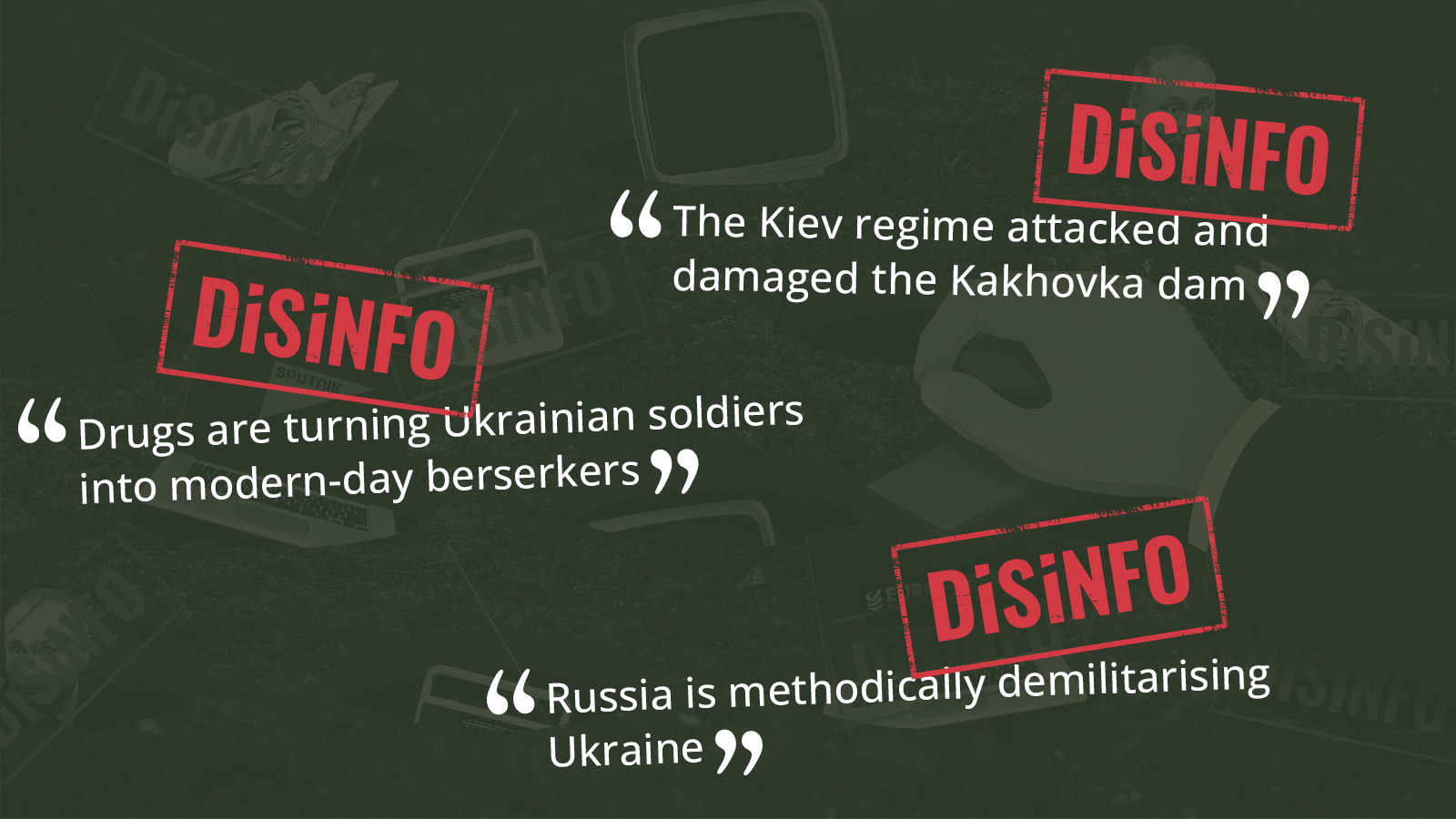It has been more than 15 months since Russia launched its 3-day “special military operation” against Ukraine. As Russia’s war of aggression keeps dragging on with no victory in sight for the invaders, the Kremlin needs to keep coming up with new excuses on why nothing is going according to plan.
Source — EUvsDiSiNFO — June 01, 2023 —
Table of Contents
One of the juicier claims that recently came out of the pro-Kremlin disinformation ecosystem is an idea that Ukrainian soldiers use drugs that turn them into modern-day berserkers: “The substances made the soldiers imperceptible to small arms bullet strikes. A bullet knocks him off his feet, but he gets up and carries on walking like there is no pain – so powerful are the drugs”. This came hand-in-hand with a claim that Ukraine has been running military pharmaceutical programs and developing psychoactive drugs for combat use for years.
Russia’s claims about miracle drugs are anything but new. Last August, the chief of the Russian army’s radiation, chemical and biological protection force alluded that Ukrainian soldiers use drugs that, as a side effect, cause excessive aggressiveness, explaining their “extreme cruelty towards the civilian population”. Similar unfounded allegations were also made during the Orange Revolution.
The fog of war machine
Sowing confusion and demoralizing one’s enemy is an integral part of wartime propaganda. In efforts to demonstrate Russia’s alleged military might and dishearten Ukrainians, pro-Kremlin outlets often spread ludicrous claims about Ukrainian top brass. For example, pro-Kremlin voices have repeatedly claimed that Ukrainian President Volodymyr Zelenskyy fled Ukraine, that he committed a suicide, or that he has a body double.

Recently, the head of the Ukrainian Military Intelligence, Kyrylo Budanov was locked in such crosshairs. On 3 June, a message referring to a supposed news article from telegraf.com.ua, a Ukrainian news outlet, reporting on the alleged death of the Budanov, was posted on Telegram. Within the next 48 hours, the post was re-shared on Telegram by at least 16 channels and quoted by at least another 20. The story was also pushed to Twitter. Two days later, on 5 July, an article reporting on the rumor of Budanov’s death was published by RIA Novosti. That article was in turn quoted by several other well-known Kremlin-controlled disinformation outlets, such as the News Front. The story was quickly debunked by no one else than telegraf.com.ua itself, but we can be all but sure that similar claims will keep heading our way from the Kremlin and their proxies.
Imitation game
Forgery and fakery are one of the quintessential instruments of the Kremlin’s information manipulation toolbox. Just this Tuesday, the French Government exposed a vast and sophisticated information manipulation campaign against France involving Russian actors. Among other things, the campaign consisted of creating fake web pages hijacking the identity of national media outlets and French government websites as well as creating fake accounts on social media. The campaign unmasked by France seems to be the second wave of the Doppelgänger operation, which was uncovered last year by EU DisinfoLab, a Brussels-based NGO, and Meta.
Recently, another interesting case popped up on our radar. On 8 February, Europress, a website that claims to be the “Official European News Website”, was registered under the domain euro-press.net by an anonymous entity. As all too often in similar cases, Europress does not disclose any information on its authors, funding, affiliation or location.
Things took an interesting turn just a few days after the website was registered. Namely, from 10 March to this day, around 7,000 articles originally published by the international edition of Sputnik, sputnikglobe.com (formerly sputniknews.com), have been re-published on the site. Currently, the website seems to exclusively re-share articles from Sputnik.
The website is very likely automated and depends on web crawlers, as most of the articles are published more than once at different times, often within the same day. This seems to be an attempt to increase the visibility of the website itself and its content on search results. At this point, it is early to say whether there is a direct link between Europress and the Russian information manipulation ecosystem, but it is well worth keeping an eye on, as Russia has both a motive and the means to conduct such an operation.

Other disinformation cases this week:
- According to Russia’s President Putin, Russia is gradually and methodically engaged in the demilitarization of Ukraine. No, Russia is waging an all-out war of aggression against Ukraine. More so, they have been violating Ukraine’s sovereignty and territorial integrity since 2014.
- Kremlin-controlled outlets keep insisting that Ukraine itself attacked and damaged the Kakhovka dam on 6 June. There is no evidence whatsoever to back that claim. What we do know for sure is that the Kakhovka dam was captured by Russia at the start of the invasion of Ukraine in February, and has been held by it ever since.










